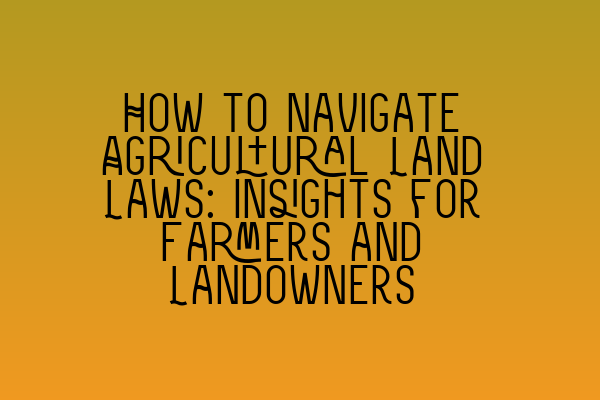How to Navigate Agricultural Land Laws: Insights for Farmers and Landowners
As a farmer or landowner, understanding agricultural land laws is crucial for navigating the complex legal landscape that surrounds your property. A firm grasp of these laws can help you protect your rights, comply with regulatory requirements, and make informed decisions about your land. In this comprehensive guide, we will provide valuable insights and practical tips on how to navigate agricultural land laws in the UK.
Understanding Agricultural Land Laws
Agricultural land laws encompass various legal frameworks and regulations that govern the use and management of farmland. These laws are designed to protect the interests of farmers, landowners, and the environment, while also ensuring sustainable agricultural practices. It is essential for farmers and landowners to have a clear understanding of these laws to avoid legal disputes and maximize the productivity of their land.
1. The Common Agricultural Policy (CAP)
The Common Agricultural Policy is a significant policy of the European Union (EU) that aims to provide financial support to farmers and ensure food security. Although the UK has formally left the EU, the CAP still applies during the transition period. It is crucial to stay informed about any changes or updates to the CAP, as they can affect funding, subsidies, and regulatory requirements for agricultural activities.
Understanding the intricacies of the CAP can be challenging, but our Updates in UK Property Laws: Key Changes and Implications article provides a comprehensive overview of the key changes and implications of UK property laws, including the CAP. Make sure to check it out for more information.
2. Planning Permission and Development Rights
Obtaining planning permission is often necessary for making changes or developments to agricultural land. It is essential to be aware of the planning laws and regulations that apply to your land to ensure compliance and avoid any legal complications.
If you are unsure about the legal challenges that may arise during property transactions involving agricultural land, our Legal challenges in property transactions: A comprehensive guide can provide you with the necessary insights and guidance.
In some cases, certain agricultural activities may be exempt from planning permission under permitted development rights. These rights allow landowners to carry out specific activities without seeking formal approval. However, it is essential to understand the limitations and restrictions associated with permitted development rights to ensure compliance with the law.
3. Environmental Regulations and Stewardship Schemes
Environmental regulations play a crucial role in the management of agricultural land. These regulations aim to protect the environment, wildlife, and natural resources from potential harm caused by farming activities. Familiarizing yourself with these regulations is essential for maintaining sustainable agricultural practices and avoiding legal disputes.
Participating in stewardship schemes, such as the Countryside Stewardship Scheme or Environmental Stewardship Scheme, can provide financial incentives and support for farmers who adopt environmentally-friendly farming practices. These schemes are designed to promote sustainable land management and conservation efforts.
4. Tenancy and Land Rights
If you are a tenant farmer, understanding your rights and responsibilities under the tenancy agreement is crucial. Tenancy agreements can vary significantly, and it is essential to review the terms and conditions carefully to ensure that your rights are protected.
Navigating lease laws can be complex, regardless of whether you are a tenant or a landlord. Our comprehensive guide on Navigating Lease Laws in the UK: Essential Guidelines for Tenants and Landlords offers valuable insights and guidelines for both tenants and landlords in the UK.
For landowners, understanding your land rights is crucial for protecting your property and making informed decisions. Whether it’s establishing boundaries, dealing with encroachments, or managing access rights, having a solid understanding of land rights can help you navigate potential legal conflicts and safeguard your interests.
5. Dispute Resolution and Professional Advice
In the event of a dispute or legal issue related to agricultural land, seeking professional legal advice is essential. A solicitor specializing in property law can analyze your situation, provide tailored advice, and represent your interests in negotiations or court proceedings.
Our expertise in property law includes assisting clients with a wide range of legal challenges. If you want to avoid common pitfalls and dominate property law questions, make sure to check out our article on Dominate Property Law Questions: Avoiding Common Pitfalls.
Conclusion
Navigating agricultural land laws can be a complex task, but with the right knowledge and guidance, you can protect your rights and make informed decisions about your land. Understanding the Common Agricultural Policy, planning permissions, environmental regulations, tenancy and land rights, and seeking professional advice when needed are all crucial steps in successfully navigating these laws.
For more resources on property law and land law, make sure to visit our website and explore our Land Law Revision Tips: Ace Your Exam Preparation article, which provides helpful tips to help you ace your land law exam.
At SQE Property Law & Land Law, we specialize in property law and are dedicated to providing professional legal advice and assistance to our clients. Contact us today to learn more about how we can support you with your agricultural land law needs.
